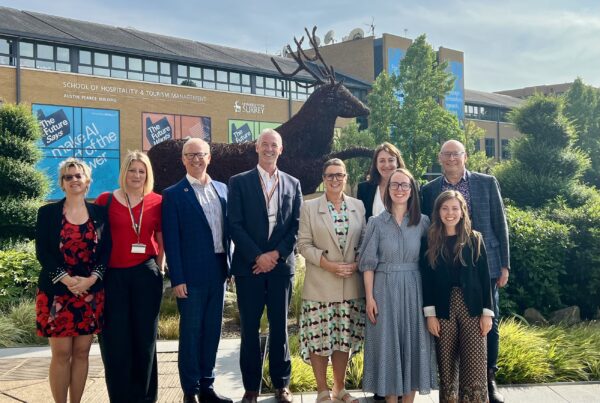The growing mismatch between lifelong learning needs and our model
With consultation on the Universities Accord now closed we will soon learn where second stage submissions have come from and what they have to say about 70+ big and spikey ideas. From media commentary since July 19th it is fair to make some assumptions already.
Like the 300+ submissions to the 49 questions in the consultation paper, most of the feedback will be from institutions and groups within the sector. There are likely to be very few from other global higher education leaders. And those from business and employers are most likely to be from business associations and peak bodies of professions.
There is a sense in which the whole exercise in seeking consensus and an accord has been made more straightforward by the existing ecosystem and community having a conversation with itself. It means the debate has been more about the share of spoils from incremental changes to the current arrangements, than about changing the model itself.
But what if our current model is no longer fit for purpose? Who of the current institutions is going to say that? And is that the view most likely to be expressed by business and professional peak bodies when their primary place is within the establishment?
The innovative start-ups that have become the disruptive new businesses in the wider economy, respond to any failures to adapt by the learning economy, by taking their own innovative steps. They do that more than write submissions to public consultations. We may have to find other ways of learning from them and actively draw their lessons into our self-reflection. If we want to stay relevant that is.
A dominant trend in leadership development and lifelong learning is the growing divergence between vertical and horizontal knowledge and skills. Horizontal skills needs are growing through the accelerating emergence of new knowledge and content. Our traditional bachelors, masters and even new micro-credential offerings have been designed as products we have evolved to serve such needs, that allow us to share our research-driven knowledge base with our students. They served us well when knowledge advanced slowly and incrementally. They served learners well before AI appeared as an existential threat to the idea of people having to learn all knowledge directly themselves to be productive.
Vertical leadership skills involve managing self and dealing with ambiguity and complexity, in multi-dimensional settings, that call for systems thinking. These skills are aided by social interaction in our traditional higher education model undertaken with peers, and in learning communities. They are enhanced by tasks we set in student enquiry and experiential knowledge and skill development in the learning institutions. We augment them with well-controlled interactions in workplaces and in partnerships with professions and employers.
Our challenge is that business and the world of employment are now moving exponentially. This is creating a need to equip business leaders for ambiguity to a much greater extent than endowing them with knowledge. It is making many of our higher education links to employers in conflict with our models designed primarily for horizontal knowledge learning.
It is likely that evolution in higher education, and maturing AI and our ability to incorporate it into our learning and work practices, will continue to cope with horizontal learning needs. Vertical leadership development needs a new approach in preparation for what’s next.
Canva, as a dynamic and innovative employer, is exploring stretch experiences from diverse and challenging working and learning settings. It uses them as catalysts for transformation and the collisions that allow change leadership and complexity management capacity to be grown. It recognises the needs for peer learning in work communities and the needs leadership development has for exposure to competing ideas from outside of their system.
We see a growing mismatch between the current higher education model and the new paradigm behind broader future business learning needs. The emergence of AI will be likely to lead to an acceleration of this. The mismatch is linked to what we reward in learning and working. Our education models reward perfection and accumulation of knowledge. They reward and expect acquiring increasing certainty. But employers increasingly seek and reward workforces with mindsets and skills around ambiguity, unlearning and vulnerability.
Much of this mindset mismatch will inform leadership development strategies. It does with Canva, who also focus on developing products for higher education to democratise learning. These focus on developing creative, generic skill capability beyond discipline knowledge. We discussed many of these issues, in the broader context of the accord and changes in leadership development needs, in a recent episode of HEDx you can listen to here.
In many ways, skill development using technology, in ambiguous, human complexity, is becoming what learning is needing to focus on. It needs the skills in unlearning and relearning as much as assumptions of accumulated, certain, and unchanging knowledge. And it needs partnerships between employers and learning facilitators reconceived for this new paradigm to overcome the mismatch that has emerged. Does our accord see and imagine this? And is its development process and consultation allowing this to be called out? Or have mechanisms to inform it on an ongoing basis?
Is the future for micro learning at 5-6 pm on a train to replace campus-based learning? Or will both be augmented by social learning with enlightened employers who are thinking of personalised learning touch points for all their workforce?
We might have to make technology enabled employment a venue for future oriented, relevant lifelong learning facilities by smart learning facilitators from a new model of higher education. This needs embodied mind sets in higher education leaders and from leaders of the accord. We might need to get out of our higher education bubble and create a psychological safe innovation environment that separates performance and learning zones and rewards them differently and separately. The Tertiary Education Commission on its own may not be the answer to that. A learning capability for the sector that gives space to think and debate and create the future might be the piece that is missing at present.
First published in Campus Review on 4th September 2023.
Professor Martin Betts, Co-Founder of HEDx
Caitlin Gleeson, Global Leadership Development Lead, Canva
Dr Nora Koslowski, Chief Learning Innovation Officer, Melbourne Business School









